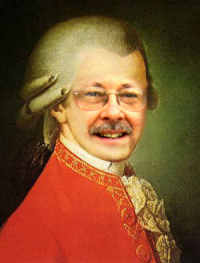A 365-Day Project
"We Are All Mozart"
A project to create
new works and change
the perception of the
music of our time.


 June 4, 2006
June 4, 2006 
For years, this question has been surfacing in my mind: Why is the number of compositions so meager among contemporary composers? (I'm writing this without having yet read the detailed responses to my composer productivity survey.)
From other artists and 'knowledge workers', we anticipate much more. Journalists write stories daily, and numerous features in a year. A photographer's portfolio is crammed with images, always more of them and always new ones. I attended an artist's opening a few days ago, and completed sketches, pastels, watercolors, and drawings in other media covered the walls, with hundreds of finished works in notebooks -- the results of just a year of effort. Novelists routinely invent dozens of books and hundreds of essays and short stories in a career. Ceramic artists can produce crates of finished pieces in a year.
I'm thinking of good, competent artists with abundant skill and bountiful ideas. This is not about cheap, quantity-before-quality work.
It's true that some work takes physical time that cannot be cut short and demands a large crew and a huge budget to complete, including that by architects and filmmakers.
The composer is not that kind of artist. A musician with technique in hand can craft a piece in hours. And, yes, it's true that the full range of musical composition today involves creating publishable scores, parts, and demos. Even so, it's not a crushing burden, and far easier than an Osmiroid and a straightedge, or even transparencies. Yet the composer with more than a dozen or so works in a year is a rare exception. And that prolific composer with a thick portfolio risks accusations of repetitiveness or weakness of inspiration, or even of betrayal to the great artform that is musical composition. Productivity is at best limited to the school years. (Lorin Maazel claimed he had a teacher who demanded a fugue from him every day. Why did he stop?)
In this postmodern age, some appeal to the model of Webern, the poster boy of meager output with his mere 31 numbered works. "But what works they are!" Yeah, I heard that coming. But it was also Webern's gimmick, for Webern's quantity of output was actually higher that it appears in the mirror of music history. Nothing but temperament and a sleight of hand kept this idea afloat, for there were actually 107 pieces inside those numbers, another 44 without numbers, and a large collection of works only in manuscript, as well as sketches and arrangements. Yes, the compositions were short, but the Webern gimmick was successful, and persists.
By contrast, those who appeal to Webern will point to Alan Hovhaness, with 415 opus numbers, as the author of a vast body of mediocrity -- practically the Patron Saint of Mediocrities, as Shaffer's Salieri exclaims.
How did we come to this state? How could Vivaldi and Telemann and over and above all Mozart, authors of an immense corpus that included many (to be kind) clinkers, come to be so revered? And how, conversely, did meagerness come to be revered in contemporary nonpop?
I'm not a historian. Through the lens of the present, I witness a time pressure for some composers, and a lack of artistic pressure for others. Some are dogged by the damnation of academia, where they can earn their daily bread but find little time for composing. Conversely, to the unpressured composer, when there is little call for and even less public attention to one's work, a self-defensive preciousness can ensue. Attention to detail is refined for refinement's sake, for what else will fill the time until the next opportunity for performance? What else to keep one's self-image away from the suicidal?
Supply-and-demand capitalism is pernicious, of course. But it's the regime under which we live. All else is denial. In an upcoming article on the presently somewhat derelict Greywolf Arts Institute website, I'll discuss the factors that led to a shift and than a cataclysmic divide between composers and their audiences. For the moment, let's just say that composers and performers and marketers succumbed to economic forces that they didn't understand and were entirely unprepared to address.
Today, however, those forces have become clear. If nothing else, the internet has raised our compositional and collegial awareness of an unsatisfactory situation needing a solution, a daring solution. So if a composer today doesn't do much and is a recluse -- and critics fret in third-party dithering symbiosis -- then what does that say about the artform? About our self image? About our societal meaning? How can an artform with miserly practitioners exist effectively in a culture of abundance?
To stir the pot even more, I'll point out that other artists market. They work to spec. They are productive. (But even there, create too much and be ready for scorn. Glass artist Chihuly comes to mind.) Save for a few, composers beg. The disrepute to my mind is not quantity, but lack of it. Not quantity, but lack of conviction to effect change. Not quantity, but subservience. (For years I've been calling for an end to the rule of the necrosones.)
Is it that hard to be a composer? There is, of course, the masterpiece syndrome. More than any other field, composers seem afflicted with this, chilled by the shadow of Bach or Beethoven or Bartók blocking the warm, inspirational sunlight. But no, being a composer is not hard. It may be painful and exhausting, but the mechanics are trivial. "Knock me out a quintet for dinner?" You got it!